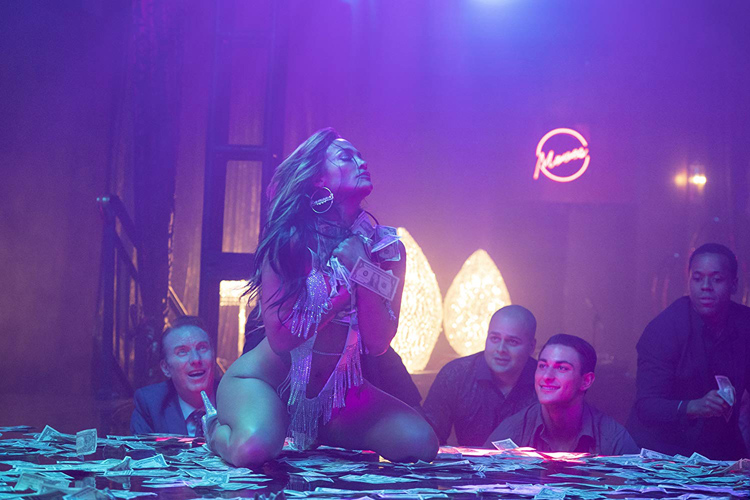Strippers are extraordinarily talented people. Pole dancing is a fine art and a difficult sport, dealing with strip club clientele takes unlimited patience, and only working nights can wear even the hardest workers down. Hustlers, the new film from acclaimed writer/director Lorene Scafaria, adds another skill to their repertoire: swindling the Wall Street bankers responsible for the 2008 recession. And like all the best stripper vs. Wall Street stories, this one’s based on actual events.
In 2015, New York Magazine journalist Jessica Pressler published what she called “a modern Robin Hood story”: strippers stealing from the rich and giving to themselves. After the recession, the number of men who could afford strip clubs reduced dramatically, leaving a small section of the clientele behind: those who profited off of the country’s misfortune. Strippers found that these men—mostly CEOs, CFOs, and stock traders—demanded far more demeaning work for far less tips. In response, an enterprising group of women devised a plan to steal their small fortunes back.
Of course, an essential element of the Robin Hood fable is missing, a fact not lost on Hustlers or the article it’s based on. The money isn’t being given to the poor. Some of the strippers do qualify as lower class, but the movie quickly establishes that their interests are self-serving rather than broadly philanthropic. Even after schemes pay off and debts soon follow, the women use their winnings to chase lives of luxury. No one’s settling for financial security—neither the criminals nor the victims.
Who’s who is surprisingly flexible. On the surface, it’s the strippers who we see robbing people, but the Wall Street tycoons have demonstrably robbed billions behind closed doors. Hustlers goes deeper than demystifying white-collar crime via comparison to street crime, though—movies have been there, done that for years. What makes Hustlers such a landmark feminist film is how it also achieves the reverse.
Hustlers is at its most thematically nuanced when it mystifies street crime via comparison to white-collar crime. Conflation of the two is established by a clever use of crosscutting early on: familiar scenes of the rich laughing and partying in Wall Street trading rooms are cut alongside scenes of strippers laughing, partying, and showering in bills. Their lust for money is shared. Worry not, Hustlers doesn’t dabble in bothsidesism—Scafaria’s screenplay is careful to underscore the difference between the greed of the oppressor and the dreams of the oppressed, and how gendered that difference is in modern America. There are powerful moments of female solidarity on display here. But Hustlers steps further than parochial empowerment by allowing women to be equally corrupted by power. The women of Hustlers are complex human beings, and complex human beings can fall into abusive patterns when left unchecked.
Ever careful with its subtext, the movie’s setting is keen to remind you that women are rarely left unchecked—there’s no better locus of the male gaze than strip clubs, after all. Hustlers is thoughtful at every turn. It’s also tremendously entertaining: the movie is absorbing, hilarious, and riotously fun, and never in a way that cheapens its subject matter. Girls just wanna have fun, Hustlers echoes, precisely because the world is so down on them. There’s space for celebration and for solemn reflection. Jennifer Lopez and Constance Wu embody this inner conflict with electrifying vitality.
The movie falters when it forces itself onto the rails of the crime genre, especially during the requisite fallout: the “consequences of their actions” portion is too rushed and too predictable, as if Hustlers felt it had to get that out of way before playing to its strengths again. Absent is the dread of a plan falling apart like a teetering Jenga tower; instead the bricks collapse suddenly and expectedly so that we can move on to the next game. But when Hustlers is playing the game it knows best, the results are unique and unapologetically female—and a blast to boot.
★★★★ (4/5)




